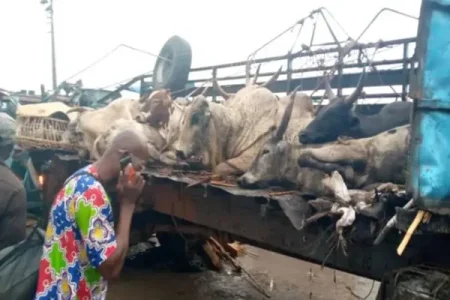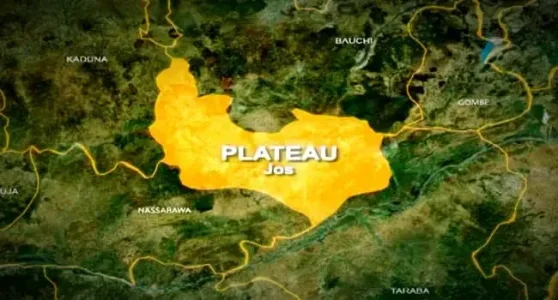
A collision on the Lagos-Ibadan Expressway involving a truck carrying cows and two passenger buses injured seven people. The Federal Road Safety Corps attributed the accident to driver fatigue. Authorities urge caution when transporting livestock and humans together and emphasize regular breaks for drivers to prevent fatigue-related incidents
In a dramatic and chaotic scene early Saturday morning, a truck loaded with cows collided with two passenger vehicles on the bustling Lagos-Ibadan Expressway, resulting in injuries to seven individuals. The incident, which occurred near the Ibafo area of the expressway, has heightened concerns over road safety and the risks associated with transporting livestock alongside human passengers.
The accident, involving a Volvo truck, a blue luxury bus, and a white Mazda bus, happened at approximately 5:35 a.m. According to Florence Okpe, spokesperson for the Federal Road Safety Corps (FRSC) in Ogun State, the truck was carrying both cows and human beings, a practice that raises significant safety concerns.
Seven people were injured in the collision. Emergency responders swiftly transported the injured to Divine Touch Hospital in Ibafo for immediate medical attention. Tragically, some of the cows did not survive the crash, underscoring the severity of the impact.
The collision caused significant disruption to the flow of traffic on the Lagos-Ibadan Expressway, a critical artery for commuters and commercial transport. Traffic authorities implemented temporary road closures and diversions to manage the situation and facilitate the rescue operations. Commuters expressed frustration over the delays but acknowledged the necessity of the measures to ensure safety.
Ms. Okpe indicated that driver fatigue is suspected to have contributed to the accident. Anthony Uga, the sector commander of the FRSC, emphasized the dangers of transporting humans and animals together and urged drivers to take regular breaks to prevent fatigue. The FRSC is investigating the incident to determine the exact cause and to develop strategies to prevent such occurrences in the future




